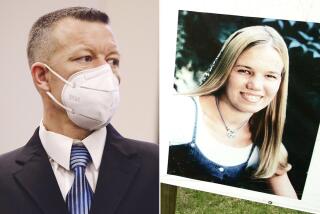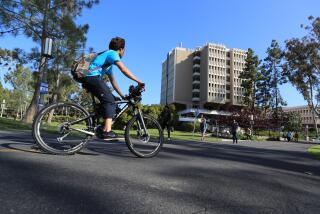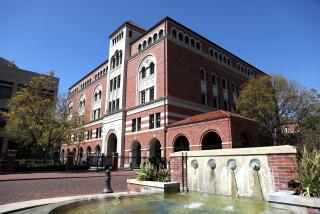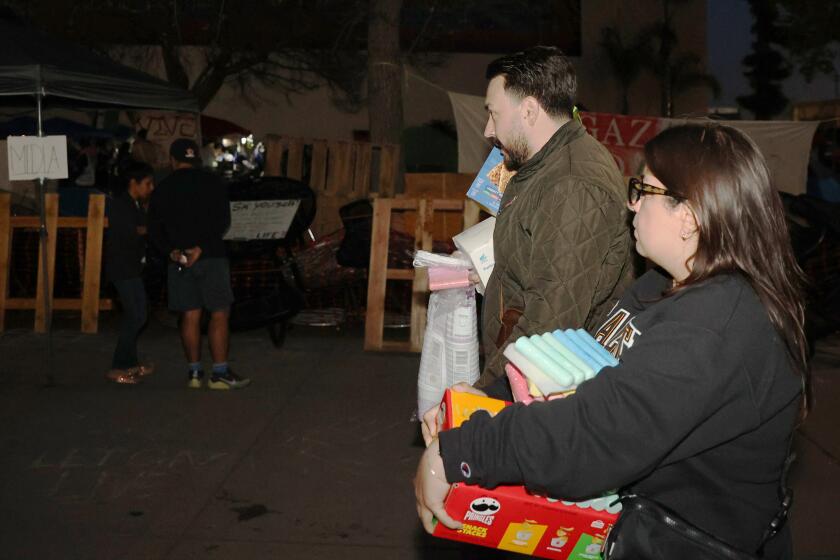Secret Dissection Class Held in UCI Laboratory : Scandal: The unauthorized course for premedical students took place in Willed Body Program’s facilities.
At least one cadaver was dissected in private, clandestine anatomy courses in the UC Irvine laboratory that is now at the center of an unfolding scandal over bodies donated for science, campus officials said Wednesday.
As many as 30 premedical students eager for a competitive edge paid about $300 each for the course, offered twice since 1998 by a tutoring company in the basement laboratory of UCI’s Willed Body Program. The program’s director, who has since been fired, once had business ties to the man who offered the anatomy courses.
University officials said they did not authorize the class, did not allow use of the donated cadaver and can find no record that the school received any proceeds from the course.
Unauthorized use of donated bodies would not only violate university policy but also would break state law by putting university property to use for private profit, officials said.
The anatomy classes, offered by a company called Replica Notes, are a focus in the widening probe into allegations of wrongdoing at the medical school’s Willed Body Program. University officials say program director Christopher S. Brown, who ran the program for three years until he was fired effective Friday, may have profited from bodies donated to UCI.
Investigators are examining whether Brown had financial ties to several companies that did business with the program and whether he steered contracts their way. University officials say he contracted with a medical transport company that he briefly co-owned with Replica Notes founder Jeffrey Frazier.
In particular, officials are scrutinizing Brown’s sale of six cadaver spines to St. Joseph’s Hospital and Medical Center in Phoenix. Hospital officials say Brown asked the hospital for a $5,000 check made out to a company unconnected to the university.
Jumbled records at the Willed Body Program also make it impossible to tell whether cremated remains of cadavers were disposed of properly or returned to families that requested ashes when research was complete, university officials have said.
*
The district attorney’s office is investigating the allegations, first discovered by the university following an audit. William Parker, an associate executive vice chancellor at UCI, confirmed the latest allegation, saying the unauthorized class took place in Brown’s laboratory. The anatomy students “paid their money to Replica,” Parker said.
Replica Notes founder Frazier has not responded to requests for comment. Brown has repeatedly denied any wrongdoing and said he pulled out of the transport service when he realized it posed a conflict of interest. On Wednesday his attorney, Michael McDonnell, though still unfamiliar with the allegations, suggested the university knew of the courses at the time.
But Parker said the university uncovered the courses in June, when Richard T. Robertson, chairman of the department of anatomy and neurobiology, found a World Wide Web site advertising classes in anatomy taught with a cadaver.
Officials say a moonlighting graduate student led one of the courses, letting students observe but not participate in the dissection. The graduate student declined to discuss the course.
UCI does not offer dissection labs--generally reserved for the first year of medical school--to premedical students, officials said. Several years ago the campus discontinued an anatomy course in which students watched an instructor dissect a cadaver.
In retrospect, Robertson said, the discovery could have come sooner. He recalled seeing more than a year ago a brochure for the Replica class that touted an official UCI connection. He dropped the matter after leaving a telephone message with Replica warning the company that the course was not sanctioned.
The June discovery of the Internet advertisement focused the investigation, which began with a routine audit in January of Robertson’s department, on the Willed Body Program.
Further investigation led to discovery of other problems, including the sale of spines in Arizona.
Parker said Robertson would probably not be disciplined “because he was the one who called our formal attention to it. . . . You might argue he should have been aware of it earlier but he certainly did what we expect department chairs to do: He asked for a detailed investigation.”
*
Anatomy labs aren’t required for admission to medical school. Some driven premedical students, however, believe the labs may give them an edge on their classmates--the extra something that sets their application apart in the cutthroat medical school admissions race. Typically, the UC schools receive more than 5,000 applications for fewer than 130 places in their four-year medical schools.
Herb Killackey, another associate executive vice chancellor at UCI, said there is a strong demand among premedical students for anatomy classes.
“A lot of this is driven by a feeling of fierce competition among the undergraduates to get into medical school,” said Killackey, former chairman of the department of neurobiology and behavior.
A case in point is the neuroanatomy class Killackey teaches for undergraduates. About 100 seniors flock to the seminar, even though they’ll have to repeat it in the first year of medical school. “The first thing I tell those students is, ‘You shouldn’t be here,’ ” he said. “This is your last chance to take a very good course, like Shakespeare, or something that will broaden your horizons.’ That’s not what they want.”
*
Times staff writer Jeff Gottlieb contributed to this report.
More to Read
Start your day right
Sign up for Essential California for news, features and recommendations from the L.A. Times and beyond in your inbox six days a week.
You may occasionally receive promotional content from the Los Angeles Times.






